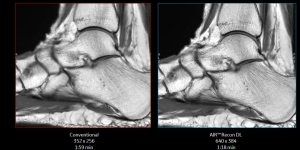by
John R. Fischer, Senior Reporter | May 29, 2020

The FDA has approved the use of GE Healthcare's AIR Recon DL deep-learning technology for MR image reconstruction.
The FDA has given GE Healthcare the green light to begin distributing its AIR Recon DL deep learning technology for MR image reconstruction.
Developed on the company’s Edison Intelligence platform, the neural network shortens scan times while providing better image quality across all anatomies to increase diagnostic confidence.
"Conventional post processing-based approaches require trade-offs," Jason Polzin, GM of Applications & Workflow, told HCB News. "AIR Recon DL is unique because it speeds up and improves nearly every exam type with no compromise. In light of COVID-19, faster scans can be used to compensate for the time spent disinfecting between patients and in some cases, even increase throughput to help with the impending backlog. Also for specific MR exams needed to diagnose COVID-19-related complications, including neurological and cardiac, we expect AIR Recon DL to benefit those procedures."



Ad Statistics
Times Displayed: 2548
Times Visited: 12 Fast-moving cardiac structures have a big impact on imaging. Fujifilm’s SCENARIA View premium performance CT brings solutions to address motion in Coronary CTA while delivering unique dose saving and workflow increasing benefits.
Scans that must show strong anatomical detail are longer due to the higher signal-to-noise and/or spatial resolution required. In contrast, shorter scans, while improving patient comfort and productivity, sacrifice image quality and diagnostic confidence.
AIR Recon DL uses raw data to reconstruct images and is equipped with a unique intelligent ringing suppression that preserves fine image details, thereby addressing noise and ringing. It also seamlessly integrates into clinical workflow to generate AIR Recon DL images in real time at the operator’s console, and has been tested on thousands of cases across a wide range of anatomies and patient demographics.
The reduction in time, according to Polzin, will enable technologists to sift through the backlog of exams built up as a consequence of the COVID-19 pandemic faster, as well as time to disinfect MR scanners in between patients.
"The amount of time reduction depends on the type of scan being performed," he said. "We typically see between 40-70% with the same or better image quality and spatial resolution. AI is a rapidly evolving field and we are always looking for new ways to leverage this powerful technology that improve scanner workflow, image quality, and aid diagnosis and interpretation."
Partners in the development and clinical validation of the technology include Hospital for Special Surgery, University of California San Francisco, RadNet, University of Wisconsin-Madison, MD Anderson Cancer Center, Medical College of Wisconsin, Centre Cardiologique du Nord in France, Erasmus Medical Center in the Netherlands, Centro Cardiologico Monzino in Italy, University of Yamanashi and Keio University in Japan, and Asan Medical Center and Haeundae Paik Hospital in Korea.
The solution is available as an upgrade or with new system purchases, and is currently available on GE Healthcare’s 3.0T MR systems.

